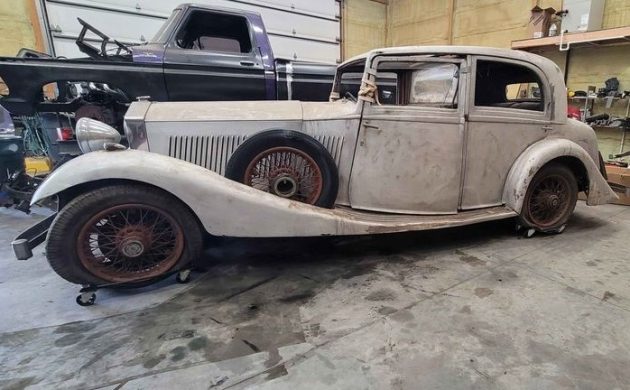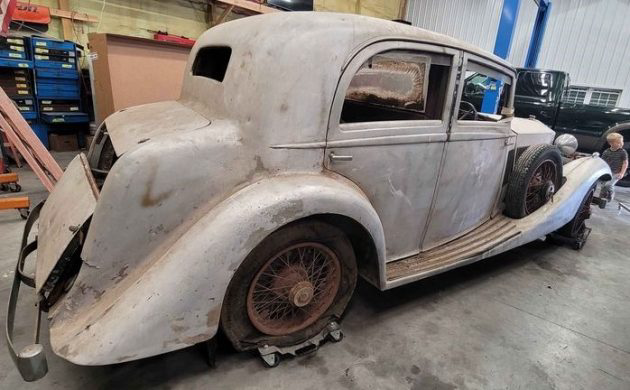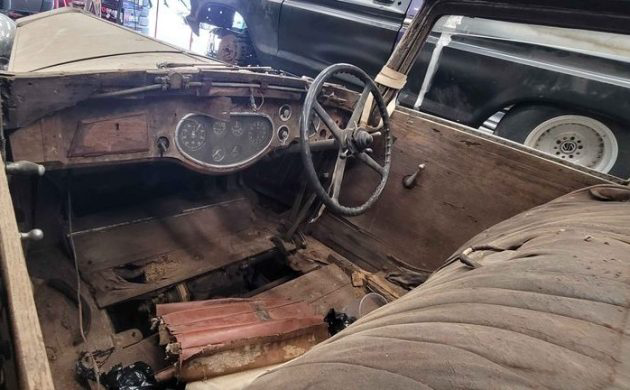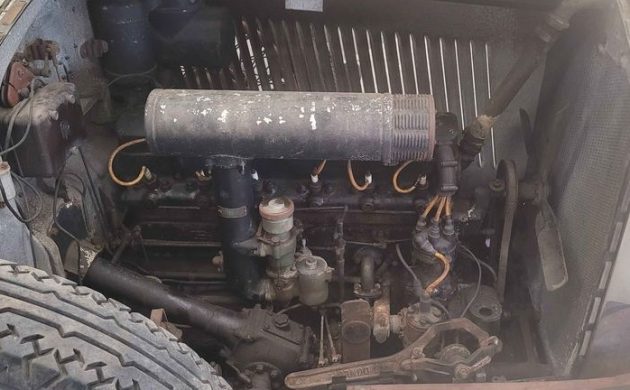We suspect this once-magnificent vehicle is a Rolls-Royce Phantom II which replaced its predecessor in 1929. Because the work to turn this grand machine into a limousine was done by coach builders designated by R-R, it no doubt was built for use by the “rich and famous”. But that was ages ago before it was parked, and time and Mother Nature brought it to its current condition. If you have the time and money to restore it (particularly money), this could be quite the standout vehicle once more. Our thanks to Barn Finder Jay L. for the tip!
All the seller tells us is this is a 1934 Rolls-Royce limousine, so we’re making some assumptions about the rest. If it’s a Phantom II turned into a limo, it used a 468 cubic inch OHV inline-6 that produced in the range of 40 to 50 hp. And it would have been paired with a 4-speed manual transmission for the chauffeur to use to change gears. Though not mentioned, the coachbuilder who created this masterpiece may have been England’s Gurney Nutting.
We’re told that buying this car gives you the chance to “own a piece of history” – and we wish we knew what that history was. The seller says it’s “super rare” and production was limited, though we don’t know how many others like it may have been made. The drivetrain is original, and the car was running when it was parked many decades ago. We get the impression that the vehicle is mostly complete, which is a good thing as how would you find parts for it 90 years later without making them yourself?
Located in a shop in Cambridge, Maryland, this right-hand-drive Rolls is available here on Facebook Marketplace. The asking price is $15,000 and we’re told it has a title. Is there also documentation that proves how and when it was imported? If you can get this once-stately machine back on the road, perhaps you, too, can sit in the back seat and ask the travelers next to you to, “please pass the Grey Poupon”.







well to me its not my thing i would crush it. But someone out there maybe looking for this..Im a muscle car guy
Wiki is wrong more like 120 horsepower.
468 cubic inches only producing 40-50 HP? The thing better be producing a lot of torque, which it probably does because the car wasn’t exactly svelte..judging by the looks of it, rust has eaten away about 200 lbs. of it.
That might be the tax rating horespower (see also Morris 10, Renault 4CV, etc).
More of a torquey engine – for making stately progress rather than burning up the road.
40 to 50 hp is the old British way of measuring an engines output. I think it was a way of eluding tax on a vehicle.
120 horsepower,not the wiki 40,50.
Restoring this to its original condition would probably be the $200 K range and then where is that market? It may be very rare but rare doesn’t always equate to valuable. If I had the time and inclination to take this on (which I don’t), I would Resto-Mod it. Fix the body, put a decent paint job on it, restore the interior to choice and drop an American V8 and auto trans to match. Make it a driver and rent it out for weddings and the like. More people would enjoy it that way than the other route of full original restoration. My take anyway….( if that really matters!)
The market for a Phantom II with a body like this is at a bit under 100K. I had a closed 4 door with a less attractive body than this one, sold it for around 65K, and a Sedanca by Windover, beautifull style and condition, that I sold for around 130K.
I expect the cost of bringing the original engine back to life will be less than putting something else in it. These are extremely well engineered and durable.
This is chassis GUB 61 (visible in the ad), which is a “34 20/25. Worth quite a bit less than a Phantom.
I agree Joe. There are a lot of really
fine American engines out there that
would do this old gal proud. If it were
mine, I’d slip in a Chrysler hemi or a
440 magnum mated to a beefed up
727 Torqueflite tranny. Face it folks,
the British can’t design a reliable car if
their lives depended on it! From side
draft carbs to cloth wrapped wiring,
the mechanics of a British car is just
a disaster waiting to happen. If the
sideways carbs don’t drip gas on to a
hot manifold and turn the poor car into a blazing inferno, a short in that
Lucas electrical system will certainly
do it in. Had a Jaguar sedan as a kid
in highschool. A wire fire under the
hood took out everything from the fire wall forward. So our came the Jaguar engine and tranny, and in went
a ’70 Chevy 350 V-8 and a T-400 tranny from a smacked Impala sedan.
The difference was like night and day.
I had a cool British car I could use every day and wow the honies all day
long. Wound up selling it to a doctor for $4K– quite a bit of cash for 1972.
Just my $.02.
Clearly Mr. Carney you have never owned a Rolls-Royce or Bentley. I have driven them for over half my life now and a properly maintained Bentley Mark VI or Rolls-Royce six cylinder Silver Cloud will rival a Toyota or Honda for dependability, reliability and ease of service. Apart from my Bentley, my primary other car is a 1998 Toyota Tacoma with over 540,000 miles so I do know a thing or two about good running motorcars.
Grand Old Dame. I had a 1934 Bentley 3-1/2 litre one off body by Hooper that I bought restored in ’86. The cost of restoration at that time was $330,000. I didn’t pay that. Ended up selling at Barrett-Jackson for $68,000. Those are pieces of Art with engines and built in furniture. This one appears to be a long ay from the road. Best of luck to all
It is a Rolls Royce but I would not call it a limo. Rolls only produced the chassis and the front crowing. There is a book that lists every 20/30 Rolls produced through the 30’s and to what body builder each chassis went to. the book also tells to whom the car was then shipped. This Rolls will be able to use many parts from the Bentleys that were produced during this period and a good carpenter is needed along with a good Rolls mechanic. Knowledge is the key to restoring and bringing it back to being enjoyed.
In the 1930s there were very few mechanical parts that interchanged between the Bentley and Rolls-Royce and even though the 3.5 liter Derby Bentley from 1934 onward was ostensibly based on the 20/25 Rolls-Royce, virtually everything was different – cylinder heads were different, carburation completely different, axles, chassis and brakes – all different. After WWII though, a different story – very few differences between the two brands.
Only @thomas crum and derek recognise what they see here. Not enough research went into the article, otherwise the writer would have seen what thomas crum has seen. This RR is 1934 but a 20/25 model, not a Phamton II. The Phantom II was enormous, a top of the range RR which no-one in their right mind would crush or hotrod because even in this shape it would have value. The cars often show at Pebble Beach and equivalent.
The 20/25 was a lesser model so the same intrinsic value does not apply, The money asked is a bit high, probably in auction in the UK, this would fetch around $10000.
As @derek points out, 40/50 and 20/25 are tax ratings for horsepower, not BHP. But it does illustrate that the Phantom II was twice the car a 20/25 was. Rolls-Royce have always refused to publish BHP figures.
Man this must if been something else in its prime. If only this car could talk I bet it’s got some stories. You have to wonder how a RR could end up in this condition and yeah 200k entry fee to even think about a restoration. Prob more in todays economy. GLWTA
….. barn finder Jay L (?)
This car is too pedestrian for Mr. Leno. He’s actually pretty sharp, knows what he’s doing and isn’t likely to pour a lot of money into what will be a rather ordinary (well, ordinary for a Rolls-Royce, at least) car.
I’m sure he’s getting tired of seeing his name mentioned any/every time the prospect of a hopeless restoration comes up, whether it’s Grandma’s old AMC Gremlin or a “Beverly Hills Hair Club, er, Car Club” money loser comes on the scene like this one.
There is such a thing as “the wisdom of crowds” but in this case, looking at our crowd’s comments – nobody really knows anything correct about this car. It is not a Phantom II, it is a 3.5 liter 20/25 and like it’s larger brother the 40/50 Phantom II those numbers have nothing to do with real horsepower at all but rather reflect the tax imposed in England based on an archaic displacement formula which favors long stroke/small bore engines.
A nice 20/25 is a pleasant car to drive, with a four-speed manual transmission, brakeservo assisted four-wheel drums so it can stop smartly as well. Cruising speed is a comfortable 55 mph with more on tap if needed.
All mechanical parts are readily available, most reasonably priced but with some exceptions such as the spendy cylinder head, but at least it is available.
The biggest problem of restoring this car will be the coachwork. Although it may be a “standard” catalogue design for the given coachbuilder, every one was constructed individually, usually hand formed aluminum or an ash frame. So superb carpentry and cabinet making skills are also required – parts from another example very likely won’t fit due to the individual construction.
The problem here is that although it’s a fairly attractive car, it’s also just another 4-door and it’s the “open” cars that worth the $$. Restoring this car is possible but there’s no financial return, if that’s a consideration. The best 4-door 20/25 in the world is probably about a $50,000 car if you’re a shrewd negotiator and it’s going to take multiples of that to restore this one.
From a mere economic standpoint, the chassis will make an excellent basis for a rebodied “special” or sporty open two seater, the bodywork could be sold to someone to stick on their S10 chassis for a unique hot rod. These scenarios are too bad but the most likely outcome. So instead of one authentic restoration, two custom creations are likely to result.
Actually there were at least three people who know something about this car before you, but don’t let that stop you from puffing out your chest.
I wish our remarks were time stamped – when I made mine, nobody had correctly identified anything – I don’t know why, but sometimes my remarks are considerably delayed. But let’s not let that stop you from puffing out your chest either.
Ignore j Walt comment if I were you. Most serious old car guys appreciate the depth of your comment even though we would never be able to afford a Rolls Royce motor car.
Good to see knowledgeable comments on this car, trying to educate the ignorant can be thankless.
no ,no please no! It must retain original running gear. If someone can give us the chassis number from the plate on the firewall (Scuttle) we can identify it exactly. I would buy it, but I live in Australia
As David points out above, the chassis plate is pictured in the Craigs List advert. It is GUB61, Anyone with basic Google research skills would find the factory spec of the chassis within minutes. I´m not going to identify the body, but that wouldn´t take much longer as it is pretty generic by R-R standards.
That apart, it would be a labour of love (folly) to restore the car as original for reasons Chinga-Trailer has stated. The car will probably be restored as a sporting tourer, much easier, cheaper and more sensible. Sad fact is, if you want a 20/25 sedan, the best do not fetch $60000 and the restoration of this generic sedan body will go way higher than that. Someone might do it but most would not,
Yeah it’s a classic old car, but it is an old worn out car. The cost to fix it is way more than the car is worth. Shame on the ones who let it deteriorate to this condition. Drove one back in the 60’s as Asst Mgr. of an Atlantic Service Station. Car belonged to Truly Nolen Treatment pest control as an adv. car. Car was so quiet your weren’t sure it was running. we would move it arround the station lot to catch peoples attention. Had a lot of people buy gas for an excuse to inspect it.